 Abraham Lincoln
If given the truth, the people can be depended upon to meet any national crisis...
Abraham Lincoln
If given the truth, the people can be depended upon to meet any national crisis...
 Guildford news...
for Guildford people, brought to you by Guildford reporters - Guildford's own news service
Guildford news...
for Guildford people, brought to you by Guildford reporters - Guildford's own news service
Interview: Surrey’s Charity Catalyst Support Celebrates 35 Years
Published on: 12 Jul, 2024
Updated on: 17 Jul, 2024
Catalyst Support is a mental health support charity that operates across Surrey. Reporter Aidan Todd speaks to its marketing and fundraising manager, Irina Bush.
When did Catalyst Support begin and what services does it offer?
“Catalyst started 35 years ago as a charity supporting people locally with drug and alcohol concerns.
“And almost instantly at the same time our counselling appeared, because when somebody is dealing with drug and alcohol concerns they could benefit from mental health support.
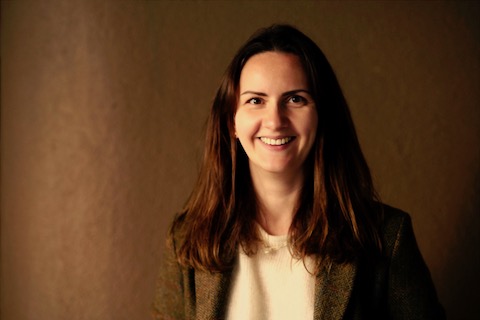
Catalyst Support’s marketing and fundraising manager Irina Bush.
“Not many people know Catalyst Support very well, but, but they know our services or the services we’re involved with, with other partners.
“We do a lot of things locally, such as the Safe Havens in Aldershot, Guildford and Woking.
“We have a counselling service that can offer up to 24 hours free confidential counselling for depression, anxiety and drug and alcohol concerns.
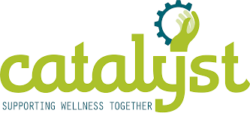 “Catalyst Support is now home to the Women’s Support Centre Surrey, based in Woking. In fact, the charity has more than 20 services that offer mental health support, drug and alcohol support, help in different critical situations, support for women and LGBTQ+ community.
“Catalyst Support is now home to the Women’s Support Centre Surrey, based in Woking. In fact, the charity has more than 20 services that offer mental health support, drug and alcohol support, help in different critical situations, support for women and LGBTQ+ community.
“There are a lot of different situations where we come in, whether there is a gap in the service, or complex cases, for example involving people with multiple disadvantages, or those who find it difficult to engage with traditional services. We fill that gap and support people who find it difficult to get support elsewhere or in the hours when main support venues are closed.”
How did the charity develop its many services?
“The charity started as a drug and alcohol service, developed its outreach services supporting people affected by drug and alcohol use, from an early stage we started offering counselling to support mental health of our clients, and gradually the charity started offering more mental health services to help people with multiple mental health concerns.
“In recent years, particularly during the pandemic, we started offering help online, and we still deliver some of the counselling session and hold many wellbeing groups online.
“In the past two years we welcomed several well-established services into the charity: Women’s Support Centre Surrey, who have supported women for over 10 years in the community, Shifa Network, supporting ethnically diverse women, and LGBTQ+ Listening Service Outline.
Can you share any success stories or testimonials from individuals or families who have benefited from your services?
“Every single service from over 20 services that we offer would have their success stories. One of the anonymised stories we have recently worked on was that of one of our clients supported by the cuckooing team.
“Cuckooing is a type of exploitation by criminal gangs. It involves befriending someone, then taking over their home and using it to deal drugs. The name comes from the cuckoo bird, which is known for laying its eggs in other birds’ nests.
“Back in 2018 Surrey Police recognised the need for a service to support people who have been affected by cuckooing. The people targeted by the criminals are often those who are alone, who do not have a support network around them, who may be lonely or have mental or physical disability.
“The perpetrators befriend victims, gain their trust and then take over their home. The Surrey cuckooing service was the first of its kind in the UK, it has received over 500 referrals since it was established, and many other counties have since created similar services based on our work.”
What are the most pressing mental health issues facing Guildford today?
“Many pressures affect people today. When discussing mental health, we often focus on internal factors such as a person’s viewpoint, thoughts and feelings. However, external factors also significantly influence our state of mind.
“For example, struggling to find a job, facing financial pressures, inconsistent income, unhealthy relationships, or bearing heavy responsibilities as a carer or parent can all impact mental health.
“The cost-of-living crisis, economic instability, and global and local uncertainties can also increase and contribute to loneliness, depression, anxiety and substance use.”
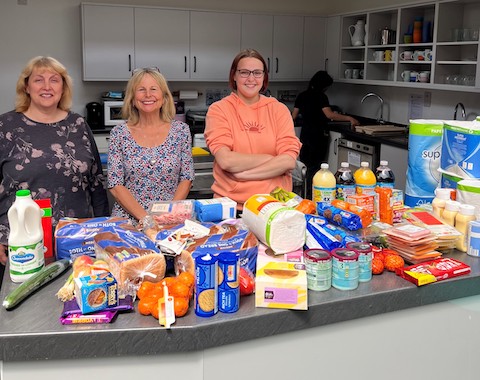
Members of Catalyst Support’s Community Connections Social Group with donations from a local businesses.
What are some of the biggest challenges you have around raising awareness of mental health in Guildford?
“The biggest challenge for us is that we have a lot of services that benefit many different people in the area, and I think we want people to know more about us because all our services are free for our clients. People can refer themselves into our services.
“There are some specialist services and outreach services, but still there is a lot of support out there that people can access as and when they need it.
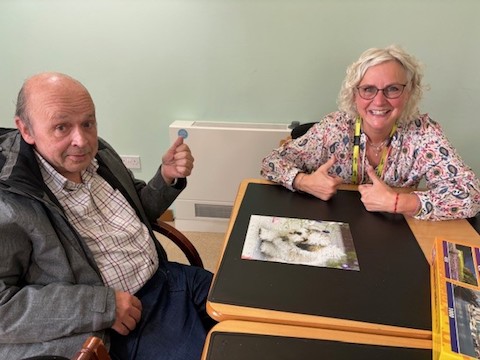
Catalyst Support’s wellbeing groups are both online and in towns such as Farnham, Guildford, Woking and Cranleigh.
“We have one-on-one support through our Community Connections programme.
“We have lots of wellbeing groups across Surrey, both online and in towns like Farnham, Guildford, Woking and Cranleigh.
“We have an LGBTQ+ Listening Service Outline that’s open three days a week that anybody can access from anywhere and talk to somebody about gender and sexuality.
“We have Women’s Support Centre Surrey, who have supported women locally for over 10 years. Additionally, we have a women’s support centre in Woking that supports women across Surrey.
“To give an example of the kind of support available, our Shifa Network works with ethnically diverse women to help build their confidence. Women here study English, learn how to swim or cycle, study for driving tests, get support to find further education or employment opportunities.
“They’ve done some fantastic work with women of different nationalities to try and build their confidence and settle them in the community.”
How can people contact Catalyst if they need support or want to get involved?
“I think the best place is our website: catalyistsupport.org.uk . All our services are listed there.”
Is there anything else you would like to mention?
“I’d like people to know we’re here, and we’d like people to know our support is free, confidential, and trauma-informed.
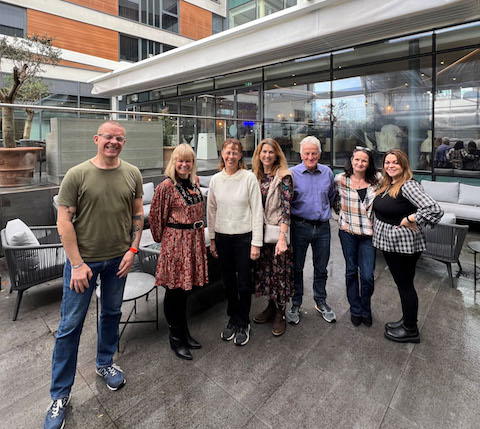
Some of Catalyst Support’s volunteers.
“Catalyst Support has 150 employees across all services and over 100 volunteers. We are very fortunate with a high number of people who support us, but we would like more local businesses to get involved with what we do, and who would recognise and support us. It takes a community to support a community, to be successful in recognising the needs of people, and taking action to meet those needs.
“At Catalyst Support we can offer support of group leaders, counsellors, lived experience practitioners and peer-support workers, but it takes everyone in the community to make sure people can fully recover. We’d like more people to get in touch and help us do what we do.”
Recent Articles
- Police Operation Puts Drug Gang Members Behind Bars
- Letter: Report on Councils’ Collaboration Benefits Has Been Over-hyped
- Council Tenants Unhappy With the Way GBC Handles Their Complaints
- Declaration Marks 750th Anniversary of a ‘Dark Day in Guildford’s History’
- Letter: For Democracy to Work We Need to Engage
- Reported Council Collaboration Savings Contested By Opposition Councillors
- Suspect Arrested Following Collision with Pedestrian in Guildford
- Notice: Free Valuation of Stamps, Coins, Trading Cards and Gold, January 29
- Witness Appeal Following Serious Collision
- Flashback: Tills Rang Out as Festive Shoppers Flocked to Guildford


Search in Site
Media Gallery
Dragon Interview: Local Artist Leaves Her Mark At One of England’s Most Historic Buildings
January 21, 2023 / No Comment / Read MoreDragon Interview: Lib Dem Planning Chair: ‘Current Policy Doesn’t Work for Local People’
January 19, 2023 / No Comment / Read MoreA3 Tunnel in Guildford ‘Necessary’ for New Homes, Says Guildford’s MP
January 10, 2023 / No Comment / Read More‘Madness’ for London Road Scheme to Go Ahead Against ‘Huge Opposition’, Says SCC Leader
January 6, 2023 / No Comment / Read MoreCouncillor’s Son Starts Campaign for More Consultation on North Street Plan
December 30, 2022 / No Comment / Read MoreCounty Council Climbs Down Over London Road Works – Further ‘Engagement’ Period Announced
December 14, 2022 / No Comment / Read MoreDragon Interview: GBC Reaction to the Government’s Expected Decision to Relax Housing Targets
December 7, 2022 / No Comment / Read MoreHow Can Our Town Centre Businesses Recover? Watch the Shop Front Debate
May 18, 2020 / No Comment / Read More









Recent Comments